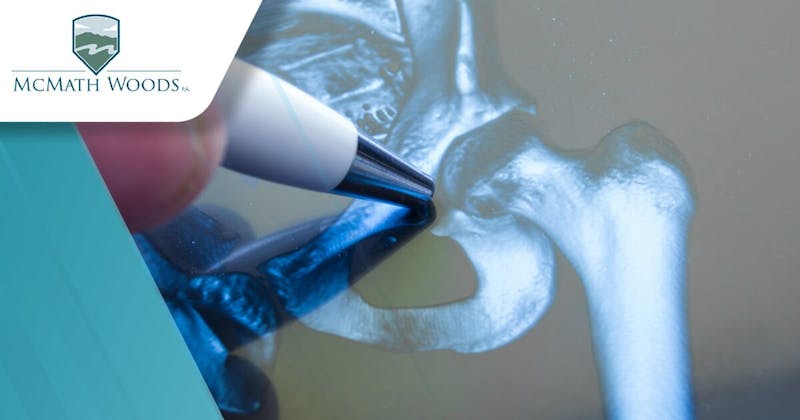
Residents of nursing homes are vulnerable to falls. Age, physical limitations, and underlying health conditions can all increase the risk factors. One unfortunate outcome of a fall is a hip fracture. These injuries can lead to serious complications, such as chronic pain, reduced mobility, and even an increase in mortality.
At McMath Woods, P.A., we have seen what can occur when the home facilities and their staff members don’t take falls seriously. These incidents often result in painful and lifelong consequences for these accident victims.
Let’s look further into the complications of nursing home falls and hip fractures.
Assisted Living Facilities Must Protect Residents
The nursing home facilities are responsible for reducing the occurrence of falls. These healthcare professionals need to implement programs that focus on assessing the residents’ fall risk and modifying the environment to help reduce potential accidents.
Some of these statistics from the Agency for Healthcare Research and Quality concerning falls are troubling:
- Around 1.6 million residents in U.S. nursing facilities, approximately half of whom will fall annually.
- Of those residents, 1 in 3 who fall will fall two or more times a year.
- For those who experience a fall in a nursing home, 65,000 patients suffer a hip fracture each year.
Unfortunately, those in nursing homes and assisted living centers often mark off all the checkboxes for fall risks. By most accounts, these individuals:
- Are 65 or older: As people age, they may experience a decrease in muscle strength, impaired vision, or balance issues.
- Have mobility issues: With the decrease in mobility, many people turn to assistive devices to help them move around their surroundings. However, any assistance device, such as walkers, can tip over, leading to a fall risk.
- Experience cognitive impairment: Some residents may also experience issues with cognitive decline or dementia, which can lead to poor judgment, confusion, or disorientation, contributing to fall risks.
With all those reasons listed, it is up to the nursing home to ensure that those vulnerable patients do not fall into their facilities.
Why Do Falls Happen in Nursing Homes?
While some falls are accidental, there are some cases where the falls were the direct result of negligence in nursing homes. Slippery floors, poor lighting, or even equipment in walkways like wheelchairs can contribute to falls in nursing homes. Many of these incidents are due to the lack of properly trained or sufficient staffing in these facilities.
The issue of chronic understaffing can lead to inadequate care for residents. In turn, that can compromise their safety and overall quality of life. Insufficient staffing levels also increase the risk of malnutrition, weight loss, and related health issues among residents. All those factors can lead to falls.
High turnover rates with caregivers exacerbate the crisis. Many nursing homes have lost large numbers of workers since the start of the COVID-19 pandemic. As a result, nursing homes don’t have the staff to properly care for their residents. When that occurs, it can lead to falling hazards around the facility.
Short staffing directly impacts the well-being of residents, and the impact cannot be overstated. Tasks may be skipped, causing a hazardous environment for residents to try to maneuver on their own. Plus, without adult supervision, these individuals may fall and not get the help they need in a timely fashion.
When that happens, it can lead to severe injuries like hip fractures.
Why Hip Fractures Are Dangerous
Hip fractures are a common consequence of falls in nursing home residents. They can have serious long-term effects on their health and well-being.
When it comes to the severity of hip fractures, they often require surgical intervention and hospitalization. Recovery can be a long and painful process. Often, the individual may require assistance with daily activities for an extended period of time. The impact on the individual’s quality of life can be devastating. These residents will have to deal with pain, loss of independence, and reduced ability to perform daily activities.
One of the biggest impacts of a hip fracture is reduced mobility. It can lead to a variety of complications, including bed sores, blood clots in the legs or lungs, and muscle loss. In turn, muscle loss increases the risk of falls and re-injury.
Unfortunately, the consequences of a hip fracture can be even more severe. Older adults who experience hip fractures face a higher mortality rate compared to those without these fractures.
Falls are the leading cause of injury and injury-related deaths in adults over 65, and approximately 300,000 hip fractures occur annually in the United States due to falls in older adults. These fractures place a major economic burden on the healthcare system. One estimate forwarded in a scientific journal article published by JB & JS Open Access stated that hip fracture accounts for roughly $5.96 billion per year in direct medical costs.
The mortality rates associated with hip fractures are also concerning:
- The one-year mortality after a surgically repaired hip fracture is 21%.
- If the fracture is not repaired, the one-year mortality rate increases to about 70%.
- Even with optimal treatment, the disability caused by the break can continue to impact mortality rates over subsequent years.
If you have a loved one in a nursing home environment, these statistics and facts can be distressing. In these spaces, it is up to the nursing home to ensure the safety of your loved one by reducing their risks of falls.
Unfortunately, hip fractures are one of the most common results of these incidents. Without the right care, they can lead to deadly consequences.
At McMath Woods P.A., we know that keeping our older family members protected is the top concern. Whether your loved one fell as a result of inadequate supervision or the staff failed to take measures to prevent an incident, our team of legal professionals is always here to assist.

